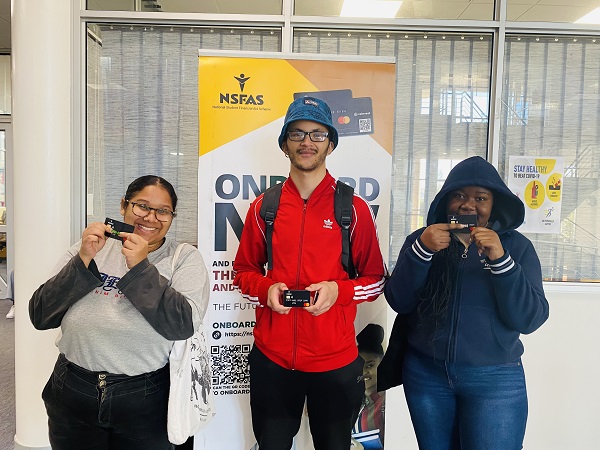By Thapelo Matlala
A tapestry of enraged emotions has erupted amongst Rhodes University students after the National Student Financial Aid Scheme (NSFAS) outsourced the payment of living allowances to a private financial intermediary. Several financial intermediaries were recently appointed by NSFAS to disburse living allowances across the country, with Rhodes students informed on 22 June that their funds would be paid by Coinvest.
The students were told that according to NSFAS, approved beneficiaries had been contacted via SMS or email with regards to the onboarding system (how to register themselves with the new bank). But students say the new banking system was the start of financial discomfort for them.
Final-year student Jaydin Fischat said the system was not friendly in acknowledging his details, and it took him about a week to get verified. He sniffed, with a breaking voice, explaining that he still has not received his living allowance for July. “My parents had to borrow money from other people to send me back to Makhanda and to ensure that I have enough food,” said Fischat.
His statements were echoed on the UCKAR Rhodes 2023 student page by posts stating that many students had been unable to return to university after the vacation because their allowances were not paid and they could not afford transport.

Simiso Qiniso Ngubane, who is a final-year student in Psychology, said, “I don’t like the new system because it’s obviously complicated. If it was a solid thing, we would have already received our allowances. It was going to be better if NSFAS let our institutions distribute our June allowances and then implemented the new system during the course of July.”
Student Jordynn Human said, “To be quite honest with you, I think it’s quite stupid because the ones that we’ve been using were so effective, and I would get money in at the end of the month before the new month would start. I can see everyone around me is complaining about this; I am not the only one who is struggling. So I just feel like we should have just stayed with the old system.”
Another final year BCom Information Systems student told Grocott’s Mail that Coinvest charges an R12 payment fee when the NSFAS allowance is deposited in their account. The fee for immediate payment from the Coinvest account to a personal account is R35, and R5 is charged for an ordinary payment. The student also questioned whether her allowance was safe, saying she was allowed to log in to her account with an invalid password.
Students also complained that a declined ATM transaction now costs R8 and if the card gets swallowed, the charge will be R10. Students will be charged R50 for replacement cards if they lose them and the delivery fee of the card is R60. Withdrawing cash from another ATM will cost R10 plus R2.50 per R100, while point-of-sale swipes deduct R2 per R100.
Students also hit out at the fact that they were expected to suddenly register on the new system without much warning.
“It’s so frustrating because they expected us to do everything as soon as possible. It was just a thing that they had introduced and they wanted students to start onboarding on the system. You know, most of the time when there’s traffic on a certain website or a system, it’s kind of slow. It gives the others problems,” said another frustrated student. She added that her accommodation allowance was not disbursed and her landlord was “on her neck to pay the rent”. At another time, she was unable to log in because the system said her ID did not exist.
Student Matthew Nthinya said he didn’t experience any complications and was assisted by a Coinvest employee who is currently hosted by Rhodes University. Nthinya wished Rhodes University had communicated with students earlier, saying that with a lot of scams occurring, students were skeptical about onboarding themselves.
Student Anelisiwe Mgidlana told Grocott’s Mail that she was not able to upload her ID on the system because the system was unresponsive. However, she said she was coping by using her savings to mitigate the crisis.
The Socialist Youth Movement (SYM) said in a press statement that the new banking system had “caused anxiety, uncertainty and frustration” for students, and called for its immediate reversal. “Through this new banking system, the state has outsourced the provision of living allowances to profit-driven companies and afforded them monopoly power to exploit poor students through exorbitant banking fees,”the SYM said.
They added that many of the companies now paying allowances to NSFAS students were “hired without banking licences or VAT registrations”. The SYM also demanded the provision of free, quality, and decolonised education as the only sustainable solution to the higher education crisis. “A clear strategy to replace NSFAS with a system of free higher education for all students grows more urgent and more necessary with each passing year,” the SYM added.
The Rhodes University SRC and NSFAS failed to respond to questions from Grocott’s Mail.


